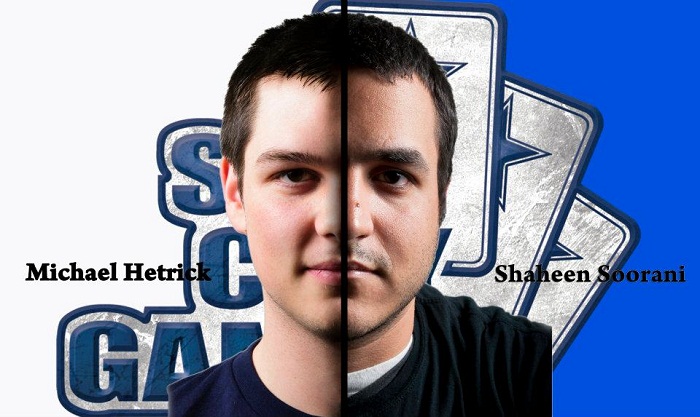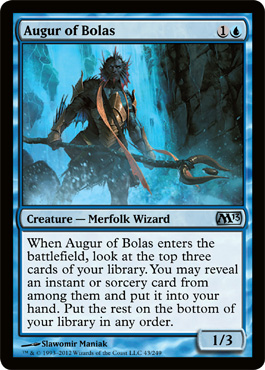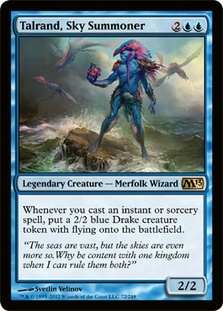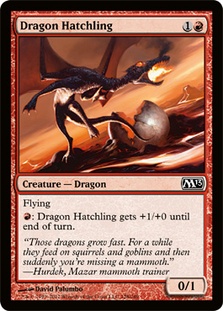This didn’t surprise me one bit:
Overall, Delver’s win percentage at the Invi (combining Day 1 and Day 2), was about 50%.
— Lauren Lee (@mulldrifting) June 20, 2012
Hold on!
Stop the presses!
Isn’t Delver supposed to be so super good that you can’t reasonably choose to play anything else? Aren’t there scads and stacks of well-respected Pro Tour champions reminding us / informing us of this "fact" delver Delver DELVER?
Put another way this also made me happy to see, Invitational-time:

… Not just because it is a great shot showing how handsome my boy Shaheen Soorani is, not just because neither he nor his better half was even playing Delver, but as a small point of vindication (for Shaheen) who had on Twitter endured pages and pages of punches, pugilism, and punditry around the general concept that "if you don’t play Delver, you just don’t want to win" or "if you want to win, there’s only one actual option" and so on.
Now let’s step back a moment.
Isn’t Delver "just" the best?
Maybe it’s the best deck. Having tested the past few weeks—and now armed with Lauren’s data from the Invitational—I am more certain than ever (and I was pretty certain last week) that most players will, on average, win more with Mono-Black Control than they will with Delver; I don’t know that this translates to "if I play Mono-Black Control I will win the PTQ," but I do know that taking Delver’s win percentage against a room full of people also playing Delver who are about as good as you, your expected record is circa 4-4.
Many players have a tendency to criticize strategies that they don’t recognize (which can oddly transform into worship on the off chance a buddy just won with it) but to ignore performance (whether mediocre-good or completely dismal) when making assessments of ones that they agree with or understand.
Consider these two situations:
1. You go 4-2 with Mono-Black Control
2. You go 0-2 with U/W Delver.
What might "your friend" say about your deck decision in either case?
1. "Where’s your Top 8? EXACTLY. I told you that deck wasn’t good enough!"
2. Nothing.
In the second case, the response is stone cold nothing. The assumption is that you made the right deck choice, you maybe made some questionable choices in game (but you made the right deck choice!)…but these things don’t always work out.
Okay, back to Delver being the best.
Yes, Delver of Secrets is the best.
Delver of Secrets is the best card in Standard Magic: The Gathering. I don’t know that that translates to Delver being the best deck. Well, what are some of the other best cards?
Snapcaster Mage is the second-best card in Standard Magic: The Gathering. Ponder is up there, and I am fairly certain a topdecked Vapor Snag has won more games over the past few months than a topdecked Primeval Titan; I am sure that in the battle of hexproof legends, Geist of Saint Traft has won more games than Thrun, the Last Troll.
Simply as a decision made around playing the best cards (which I have started to advocate more and more vociferously since the time the decorated Pro Tour champions have been telling you it would be foolish to play anything other than Jund) I would agree that you—in the abstract—want to be playing a deck with Delver of Secrets, Snapcaster Mage, and Ponder (and probably Mana Leak and Vapor Snag).
But!
Imagine we are in a situation where every single person in the room has the same thinking as you.
Delver is the best!
You can only play Delver!
The room is chock full of Delver.
Surely in that case there is a deck you can play that would give you a higher win expectation than Delver?
That is playing the metagame.
You are always playing the metagame every time you make a choice on deck to play, whether you know it or not. When you choose Delver (in the abstract) you are choosing to play the deck —because its card quality includes Delver of Secrets, Snapcaster Mage, and Ponder (the three most potent cards in Standard) and probably other Top 10 cards—that will, on average, win more. You are in essence rolling d20 and other players are rolling d6 or d12, etc., but you are still making a relative decision (d20 can roll higher than d6) even as you are trying to make an objective (reductive) one.
Between d20 and d6… "Who wins?"
Well, Magic isn’t a game of 100% certainty in unstable situations. Your opponent can roll a six with his d6 and you can roll a five with your d20 (in fact, a perhaps surprisingly hefty 25% of the time you will roll a number smaller than the maximum value on his die), but most players would agree that if your goal were to roll the highest number, you would pick the die with the biggest numbers on it.
So I certainly think that at some point you want to be choosing Delver of Secrets if you want to have the best possible chance of winning matches (where winning matches is defined by who rolls a bigger number).
Now let’s say we are playing a queer version of Rock / Paper / Scissors where:
1. Rock smashes Scissors,
2. Scissors cuts Paper,
3. and Paper covers Rock…99% of the time, but 1% of the time, the Rock busts through the paper and tears it to bits.
The behavior of other players unseen—in an imaginary universe of pre R/P/S equilibrium—the logical choice here is to choose Rock. It simply performs at a slightly better level than Paper and Scissors.
Now if you know this (it is a basic tenet of the rules of this game) then presumably everyone knows that there is "only one choice" if you want to win. Can you imagine a world (the first time out for the Pro Tour of Rock/Paper/Scissors maybe) where almost everyone chooses Rock?
Are your reductive Delver-advocates all going to raise your hands and scream, "Rock! Nothing beats Rock!" like Bart Simpson might?
The clear and obvious choice here is Paper.
Yes, in our universe in the abstract, Paper is the weakest of the three. And if you had to play a fair game against an unstable set of opponents, you might win less than 1/3 of your games. But against this room of well-informed geniuses? A flawed Paper, with only 99% chance of winning any given match, is going to have tremendously greater likelihood of success than the "right" choice of Rock.
Surely this is obvious, when the pins are all set up for you.
The last two Constructed tournaments of any significant size I played in ($5K in Edison, preceded by the SCG Standard Open + Invitational in Baltimore), I chose Delver variants both times. One reason is that Delver of Secrets really and truly is the most potent card in Standard and Snapcaster Mage is a close second; the other is that I mostly practiced Delver quasi-mirrors and I felt like "[another] U/W Delver deck" was my best matchup, where I was winning 75% or more in Magic Online queues (ironic, I know, that X-0 on camera that weekend I lost playing for Top 8 against a pedestrian, no-frills U/W Delver deck).
Now I used this word earlier "reductive" that many of you—especially if you never took a college English class—may never have heard. I tried to look it up on dictionary.com, but none of their definitions carried the connotation I was really going for.
What I mean by this is an equation or conclusion that closes off analysis or further investigation (literally "reducing" our possible lines of exploration), often by disempowering ourselves as analysts.
The first time I was scolded like so was when I said, "Poe is just crazy" as an attempted "analysis" of one of Edgar Allen’s more difficult poetic passages. When you say something like, "Poe is just crazy," what you mean is some combination of, "Poe is ‘just’ crazy [meaning, for the sake of this sentence, he thinks and expresses himself in an unusual or non-traditional way] and I am not a powerful enough thinker to change my perspective sufficiently to understand his crazy-talk," (i.e., "This is beyond me.") or, "Because he is ‘crazy’ (i.e., his perspective is compromised), this isn’t worth talking about."
Something like one of those.
Well that might be your conclusion, and I would guess that is the conclusion a good number of people might have when posed with a particular difficult question… But given the assumptions that the text yes, is in fact worth talking about (your professor asked you to talk about it), none of these answers is useful or appropriate.
You will find reductive argumentation in the mouths of a dizzying number of top players when they share their thoughts and write their articles. "Always" and "never" are not particularly useful words when talking about real-life decisions or trying to understand other people (and even lowly d6 doesn’t "always" roll smaller than mighty d20), but I would hazard that "you should just play Jund" (or Delver, today) is "never" good enough an analysis.
The vast majority of my own most memorable contributions to the Magic canon of deck design all came up when other players were extolling the win percentage of Gifts Ungiven, when anyone could see the pervasiveness of Jund in the metagame, or at the height of Caw-Blade. None of those decks were unassailable, and, in fact, it was pretty easy to beat any of them if you took the time to piece apart what made them tick and where their incentives came from.
Jund was a deck of all two-for-ones but had an atrocious mana base. Jund-on-Jund fights often devolved into topdeck wars because everyone had Blightning and copious removal.
Well can you field a deck of comparable card power and card advantage that has the capability of topdecking a more robust way to win than a Sprouting Thrinax? It turns out that not only can you, but that you can bias your two-for-ones (and even three-for-ones, which they didn’t have) to screw up their fragile mana base (remember, almost all of their spells are gold!).
Later, talented deck designers from Gerry Thompson to Brad Nelson and Jacob Van Lunen applied their prodigious efforts to putting Spreading Seas onto Savage Lands with greater and greater consistency. Now, no one is going to argue in the abstract that Ardent Plea is a more powerful three in the world of multicolored cascade compatriots than Blightning, but when Ardent Plea is making it impossible for Blightning to ever get cast?
Similarly, no one is going to argue the merits of the cards Stoneforge Mystic or Jace, the Mind Sculptor, but the reality was Caw-Blade had some pretty exploitable lines if you bothered to look. When Patrick Sullivan won the SCG Standard Open in Edison through a stack of capable Caw-Blade players… Those guys rarely had a Squadron Hawk or spent Squire to stick a Sword on to. Ember Hauler don’t play that. Put another way, if the opponent’s nut draw involves tapping all his mana on turn 4 and attacking you with the expectation of connecting with a Sword of Feast and Famine, if you can avoid his untap and just resolve your big four the next turn… Again, not so hard to win.
It is obviously still possible to come to the conclusion that you should still play The Deck To Beat, and there are times even during a "100% Rock" metagame that you will, albeit rare (most top pros today agree that while Exarch Twin had a greater than 60/40 advantage over Caw-Blade, because the better player had a crazy ~75% expectation in the Caw-Blade mirror, it made mathematical sense to play Caw-Blade during the Age of Caw-Blade if you were the better player).
Bringing it back to Shaheen, I don’t know that he did the best job of defending himself. If it were me—and I have been in this spot more than once—I would have said something like, "I tested, and I have come to the conclusion that even if the card Delver of Secrets is ‘better’ than the card Sorin, Lord of Innistrad that I have a better chance of doing well tomorrow with Sorin on my squad than Insectile Aberration."
… Which is almost certainly true for him, and the line becomes increasingly blurry as things like a Delver with a 50% win percentage start surfacing.
You might not be better armed with Esper Control than Delver (Esper Control is a complicated deck), but given the overall tone of the metagame (just play Delver, most of the top players throwing up their hands and telling you to go Delver) I really do think that you would have a better chance with MBC (which is a much less complicated but not less powerful deck than Esper Control).
Rather than "reductively" saying stuff like "that’s a bad card," I would like to touch on a couple of new ones from M13 and apply some hopefully rigorous thinking.
Augur of Bolas
"Wow, great card!"

My initial thought was that if WotC thinks that Snapcaster Mage is too good, I don’t know exactly what they were trying to accomplish with this card. Then again, I was reading it as an Impulse with a 1/3 body attached, and that isn’t what we actually have at hand.
What is a "reasonable" shell to stick Augur of Bolas into? For me, I wanted to jam it straight into Adam Boyd Mono-Blue Delver deck (which is my favorite archetype / Delver deck in the present Standard by the way). Once you start playing cards like this alongside extant Delvers and Snapcasters, Cavern of Souls starts becoming an interesting card to think about.
Well long story short, Adam’s deck has 20 lands, 12 creatures, 4 artifacts, and 24 instants and sorceries. But wait! We need to cut four cards to fit our Augurs. Let’s assume that one Mana Leak and some of the opportunistic Phyrexian variance vectors get the axe, which would leave us with 20 lands, 16 creatures, and 20 instants and sorceries.
We dig three.
Perfect fit?
At first blush, sure. Forget about the fact that you have a much narrower palette to pick from than a true Impulse; at 20/20/20 you are actually going to miss entirely a fair amount of the time!
What if Augur of Bolas instead said:
1U
Creature – Merfolk Wizard
When Augur of Bolas enters the battlefield, flip a coin. If it came up heads, draw a card.
(And the math is better than that, just like you are never really going to see a "100%" Rock field.) Might still be good; self-contained card advantage much of the time… But we aren’t so swift with our auto-ins, are we?
Talrand, Sky Summoner
"Sucks!"
Are you sure about that?
I am not so excited about a 2/2 for four most of the time, either. But I have learned to respect a Wizard like Venser, Shaper Savant with the same stats. Talrand might have less immediate impact, but if you untap with it in play?
You are going to give yourself some very decent Geist of Saint Traft insurance, at the very least!
Talrand has a limitation, and that is its 2/2 body. If we have a 2/2 for one mana, we see that as fabulously efficient, and we will live with a 2/2 for three mana when we get to get a basic land out of it (Borderland Ranger) or even for four mana when there is enough card advantage attached (Solemn Simulacrum). Talrand doesn’t fit our obvious models because it asks for a mite of patience (unless you don’t play it until you have more than four mana in play and you have some cheap cards in hand as well, say).
However, I would guess that we all agree that the ability "make a 2/2 flyer whenever you play an instant or sorcery" could be a desirable one (though maybe not in Martin Juza’s most recent deck).
So if we like the ability, what we have to do is figure out for ourselves if there is ever going to be a point that we can live with the admittedly vulnerable body at its cost.
And I think the answer is yes!
Delver decks have very little especially relevant removal. Four Vapor Snags and maybe three Gut Shots; the first don’t "kill" Talrand, and the others don’t either. Sure, you might see two Dismembers nowadays to deal with Restoration Angel, but really that isn’t a ton of removal.
Moreover, very few Delver decks have all four Mana Leaks after boards.
So is this going to stick? Can you reliably untap with it? What if you start playing Cavern of Souls (Cavern of Souls on Wizard or Human being pretty good in Delver)?
It’s not like we have a paucity of instants and sorceries! Many of them (Ponder, Thought Scour, and sometimes even Gitaxian Probe [which has its own incentives with Talrand]) even draw you into more and more instants and sorceries!
I can actually see this card as a true dominator in sideboard situations. It takes very little work to put you in a spot where your opponent can’t attack with Restoration Angel anymore, and locking down Geist of Saint Traft is rarely swinging into this guy if you have just one open mana.
Dragon Hatchling
"Sucks! I think!"
I actually had some initial reservations about this creature, but then I remembered the story of Pygmy Pyrosaur.
Once upon a time, Pygmy Pyrosaur was a dangerous sideboard card. In an age when control decks were defined by their permission, Pygmy Pyrosaur snuck under and could ultimately do massive damage and take advantage of your lands in play without ever giving the opponent another opportunity to interact hand-to-hand or hand-to-stack.
So shouldn’t Dragon Hatching be stone awesome? Flying instead of "can’t block"…um… That’s it (but essentially awesome evasion ability versus limitation).
Shouldn’t this still be a playable card?
I really want to love Dragon Hatchling, but these days they let straight blue decks play Vapor Snag, Gut Shot, and Dismember, and control decks are nothing but removal.
Oh well, "power creep."
LOVE
MIKE


